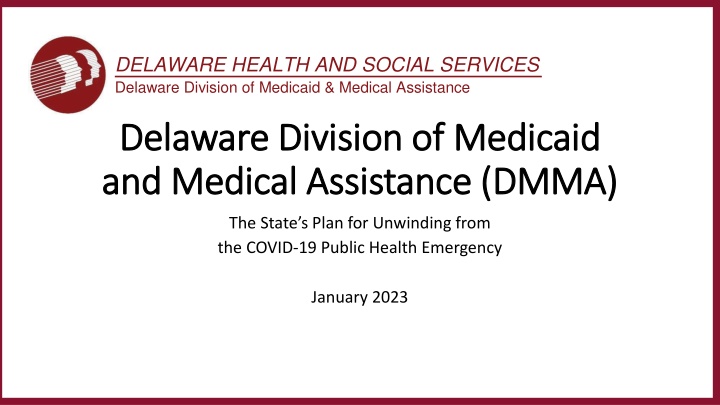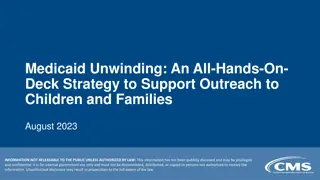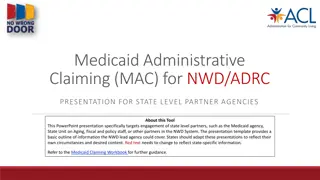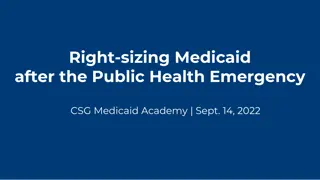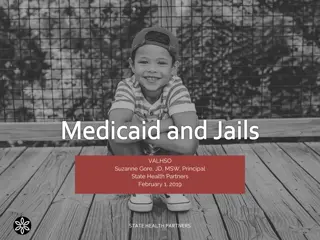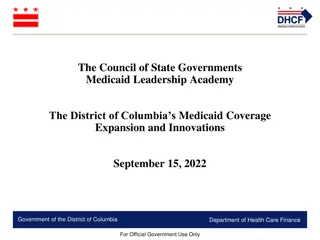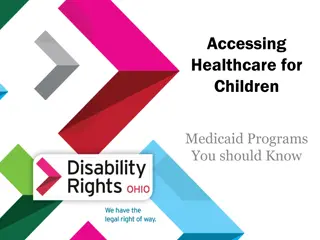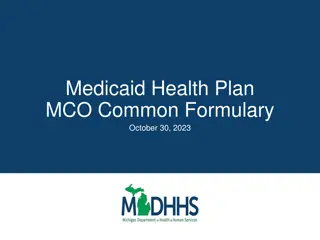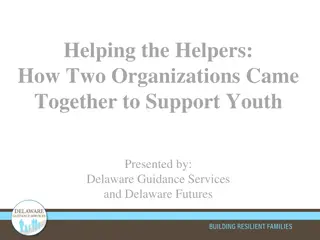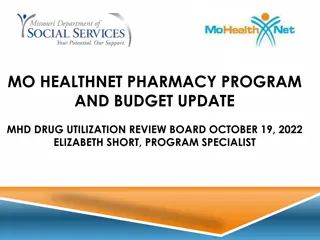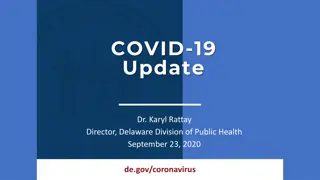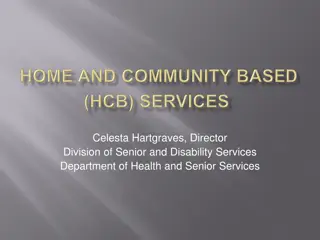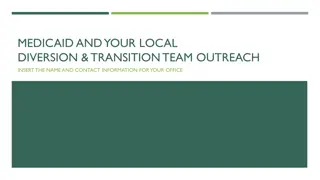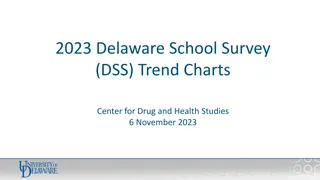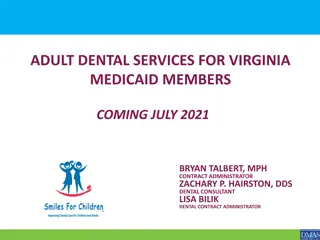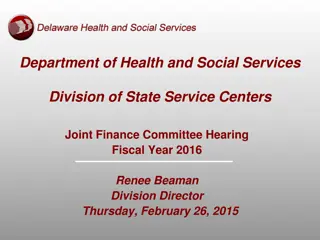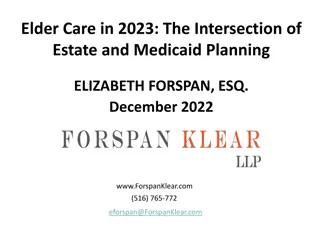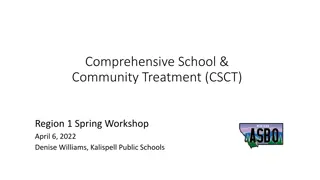Delaware Division of Medicaid: Unwinding from COVID-19 Public Health Emergency
Delaware Division of Medicaid and Medical Assistance (DMMA) is preparing to transition back to typical operations post the COVID-19 Public Health Emergency. The plan includes communication strategies, efficient workload management, and reducing the risk of coverage loss. Goals focus on member/stakeholder notifications, accurate Medicaid renewals, and leveraging CMS flexibilities. Strategies include robust communication, reducing burden on members, and aligning Medicaid renewals with SNAP eligibility.
Download Presentation

Please find below an Image/Link to download the presentation.
The content on the website is provided AS IS for your information and personal use only. It may not be sold, licensed, or shared on other websites without obtaining consent from the author.If you encounter any issues during the download, it is possible that the publisher has removed the file from their server.
You are allowed to download the files provided on this website for personal or commercial use, subject to the condition that they are used lawfully. All files are the property of their respective owners.
The content on the website is provided AS IS for your information and personal use only. It may not be sold, licensed, or shared on other websites without obtaining consent from the author.
E N D
Presentation Transcript
DELAWARE HEALTH AND SOCIAL SERVICES Delaware Division of Medicaid & Medical Assistance Delaware Division of Medicaid Delaware Division of Medicaid and Medical Assistance (DMMA) and Medical Assistance (DMMA) The State s Plan for Unwinding from the COVID-19 Public Health Emergency January 2023
Background Background During the COVID-19 Public Health Emergency (PHE), the Centers for Medicare & Medicaid Services (CMS) offered additional Medicaid flexibilities to states, to help keep people covered during the PHE. Throughout the PHE, states maintained people s Medicaid coverage, even if a change in circumstance may have resulted in a loss of Medicaid coverage. Beginning April 1, 2023, states will need to unwind or return to more typical operations, as dictated by the Consolidated Appropriations Act signed in late 2022. Part of unwinding includes returning to annual Medicaid eligibility determinations. Before the unwinding period begins, Delaware is making plans for the best way to move back to typical Medicaid operations. 2
Goals Goals Communication: DMMA commits to notifying members and other stakeholders of changes that are coming at every step of the process. Manage the workload efficiently and accurately: DMMA commits to making a plan for ensuring all Medicaid renewals are processed in a timely and accurate manner during the 12-month unwinding period. Reduce risk of losing coverage: DMMA commits to pursuing additional flexibilities offered by CMS to support increased efficiency during the unwinding period. 3
Strategies for Communication Strategies for Communication Robust communications and outreach with members and stakeholders. Members can opt-in for text alerts. Members can opt-in for email communication. The State is ensuring that members know to update any other contact information. The State is engaging with community partners and health plans to get the word out. 4
Strategies that Reduce Burden on Members Strategies that Reduce Burden on Members Align Medicaid renewals with Supplemental Nutrition Assistance Program (SNAP) eligibility. This reduces burden on members, as information only needs to be provided once. Temporarily complete automatic renewals for people when the State s check of financial data sources indicates no income and no other data is returned. This reduces burden on members, as it reduces the amount of information they need to submit. Temporarily extend automatic reenrollment into a managed care plan after a loss of coverage of up to 120 days. This helps maintain a member s continuity of care. 5
Strategies that Reduce Burden on the State Strategies that Reduce Burden on the State Renewals will be worked from oldest to newest and distributed so that no more than 1/9 of the total is completed within a month. This is a CMS requirement, and ensures that staff can also work on all other member inquiries and new applications. Temporarily extend the time to take action on Fair Hearings. Permanently increasing the reasonable compatibility threshold to 25% for income. This reduces the burden on the State, as more members will be able to be renewed automatically.
Eligibility During the Unwinding Period Eligibility During the Unwinding Period High Level Timeline Before the initiation of Unwinding Period 60-day to 30-day Notice of Start of Unwinding Period First 3 6 Months of Unwinding Period 6 months into Unwinding Period First 90-days of Unwinding Period Communication plan for updating contact information Continue processing 1/9 of total renewal applications Additional next steps communication to stakeholders if member is no longer Medicaid eligible Identify total number of cases and recalculate 1/9 of the total caseload ready for renewal to start planning resources Day 1 Active Notice in effect 1902(e)(14) waivers submitted and approved by CMS Additional next steps communication to stakeholders if member is no longer Medicaid eligible Schedule requested Fair Hearings Continue processing 1/9 of total renewal applications each month Submit request to increase reasonable compatibility threshold Continue hiring and training new staff for the Renewals Unit and Fair Hearings team Submit monthly data reports to CMS Begin processing 1/9 of total renewal applications each month Schedule requested Fair Hearings Submit State Plan Amendment (SPA) for 12 months postpartum coverage for pregnant women Communication plan for resumption of normal operations during the unwinding period Submit monthly data reports to CMS Schedule requested Fair Hearings Submit requests for overtime for managerial approval Hire and train new staff for eligibility processing Submit monthly data reports to CMS Finalize staffing plan Hire and train new staff for Fair Hearings Administrative notice to staff to advise of Verification Plan and Delaware Social Services Manual (DSSM) changes Align Medicaid renewals with SNAP recertification dates Systems changes Systems changes 7
In Summary In Summary The Consolidated Appropriations Act signed in 2022 dictates that the unwinding period will begin on April 1, 2023. Unwinding will result in an unprecedented workload for the State. The State has multiple strategies planned to reduce burden on members and State staff. Unwinding activities will take time. The State will communicate with members and stakeholders at each stage. 8
